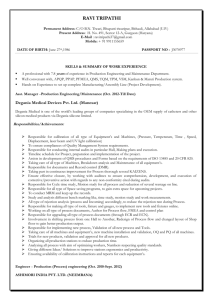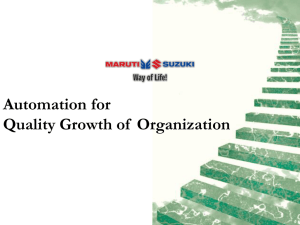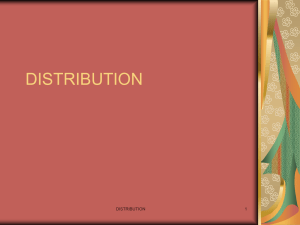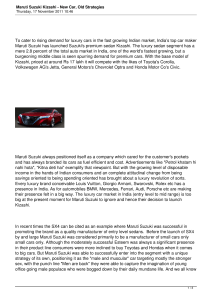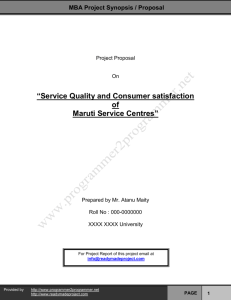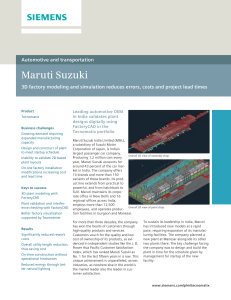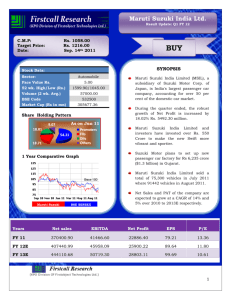Maruti Udyog Ltd. (MUL)
advertisement
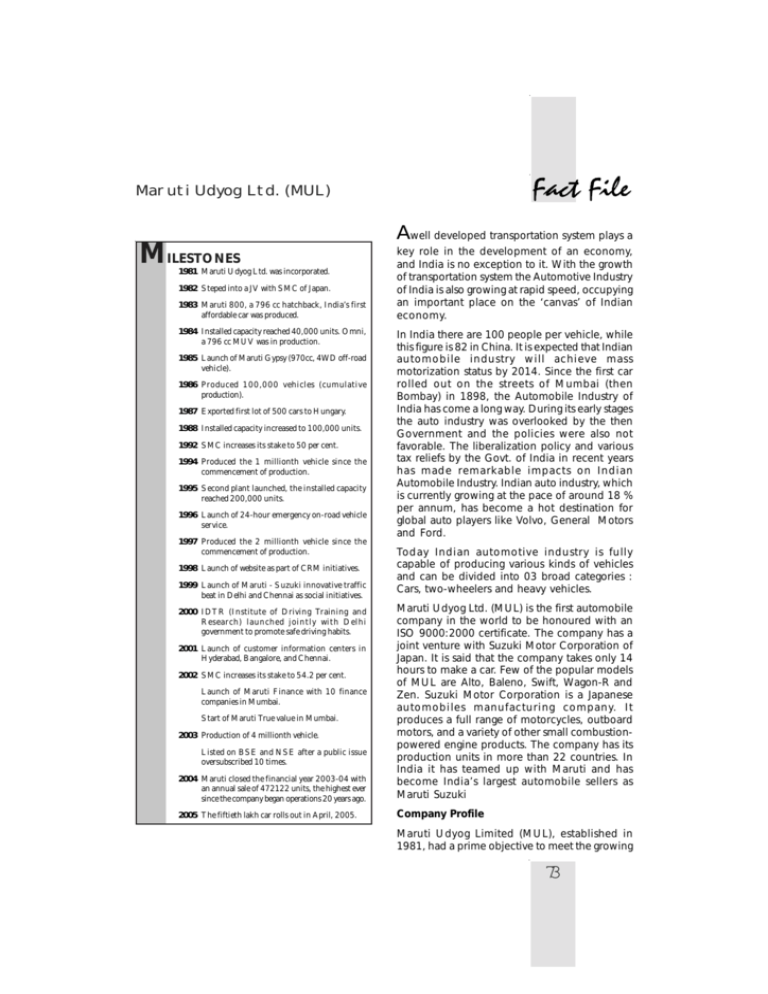
Maruti Udyog Ltd. (MUL) MILESTONES 1981 Maruti Udyog Ltd. was incorporated. 1982 Steped into a JV with SMC of Japan. 1983 Maruti 800, a 796 cc hatchback, India’s first affordable car was produced. 1984 Installed capacity reached 40,000 units. Omni, a 796 cc MUV was in production. 1985 Launch of Maruti Gypsy (970cc, 4WD off-road vehicle). 1986 Produced 100,000 vehicles (cumulative production). 1987 Exported first lot of 500 cars to Hungary. 1988 Installed capacity increased to 100,000 units. 1992 SMC increases its stake to 50 per cent. 1994 Produced the 1 millionth vehicle since the commencement of production. 1995 Second plant launched, the installed capacity reached 200,000 units. 1996 Launch of 24-hour emergency on-road vehicle service. 1997 Produced the 2 millionth vehicle since the commencement of production. 1998 Launch of website as part of CRM initiatives. 1999 Launch of Maruti - Suzuki innovative traffic beat in Delhi and Chennai as social initiatives. A well developed transportation system plays a key role in the development of an economy, and India is no exception to it. With the growth of transportation system the Automotive Industry of India is also growing at rapid speed, occupying an important place on the ‘canvas’ of Indian economy. In India there are 100 people per vehicle, while this figure is 82 in China. It is expected that Indian automobile industry will achieve mass motorization status by 2014. Since the first car rolled out on the streets of Mumbai (then Bombay) in 1898, the Automobile Industry of India has come a long way. During its early stages the auto industry was overlooked by the then Government and the policies were also not favorable. The liberalization policy and various tax reliefs by the Govt. of India in recent years has made remarkable impacts on Indian Automobile Industry. Indian auto industry, which is currently growing at the pace of around 18 % per annum, has become a hot destination for global auto players like Volvo, General Motors and Ford. Today Indian automotive industry is fully capable of producing various kinds of vehicles and can be divided into 03 broad categories : Cars, two-wheelers and heavy vehicles. 2004 Maruti closed the financial year 2003-04 with an annual sale of 472122 units, the highest ever since the company began operations 20 years ago. Maruti Udyog Ltd. (MUL) is the first automobile company in the world to be honoured with an ISO 9000:2000 certificate. The company has a joint venture with Suzuki Motor Corporation of Japan. It is said that the company takes only 14 hours to make a car. Few of the popular models of MUL are Alto, Baleno, Swift, Wagon-R and Zen. Suzuki Motor Corporation is a Japanese automobiles manufacturing company. It produces a full range of motorcycles, outboard motors, and a variety of other small combustionpowered engine products. The company has its production units in more than 22 countries. In India it has teamed up with Maruti and has become India’s largest automobile sellers as Maruti Suzuki 2005 The fiftieth lakh car rolls out in April, 2005. Company Profile 2000 IDTR (Institute of Driving Training and Research) launched jointly with Delhi government to promote safe driving habits. 2001 Launch of customer information centers in Hyderabad, Bangalore, and Chennai. 2002 SMC increases its stake to 54.2 per cent. Launch of Maruti Finance with 10 finance companies in Mumbai. Start of Maruti True value in Mumbai. 2003 Production of 4 millionth vehicle. Listed on BSE and NSE after a public issue oversubscribed 10 times. Maruti Udyog Limited (MUL), established in 1981, had a prime objective to meet the growing 73 demand of a personal mode of transport, which is caused due to lack of efficient public transport system. The incorporation of the company was through an Act of Parliament. Suzuki Motor Company of Japan was chosen from seven other prospective partners worldwide. Suzuki was due not only to its undisputed leadership in small cars but also to commitments to actively bring to MUL contemporary technology and Japanese management practices (that had catapulted Japan over USA to the status of the top auto manufacturing country in the world). A licence and a Joint Venture agreement was signed between Government of India and Suzuki Motor Company (now Suzuki Motor Corporation of Japan) in Oct 1982. Maruti Suzuki India Limited (MSIL, formerly Maruti Udyog Limited), a subsidiary of Suzuki Motor Corporation of Japan, is India’s largest passenger car company, accounting for over 50 per cent of the domestic car market. Maruti Suzuki India Limited a publicly listed automaker in India. It is a leading four-wheeler automobile manufacturer in South Asia. Suzuki Motor Corporation of Japan holds a majority stake in the company. It was the first company in India to mass-produce and sell more than a million cars. It is largely credited for having brought in an automobile revolution to India. It is the market leader in India. On 17 September 2007, Maruti Udyog was renamed to Maruti Suzuki India Limited. The company’s headquarters remain in Gurgaon, near Delhi. The old logo of Maruti Suzuki India Limited. Later the logo of Suzuki Motor Corp. was also added to it 74 Maruti Suzuki is one of India’s leading automobile manufacturers and the market leader in the car segment, both in terms of volume of vehicles sold and revenue earned. Until recently, 18.28% of the company was owned by the Indian government, and 54.2% by Suzuki of Japan. The Indian government held an initial public offering of 25% of the company in June 2003. As of May 10, 2007, Govt. of India sold its complete share to Indian financial institutions. With this, Govt. of India no longer has stake in Maruti Udyog. Maruti Udyog Limited (MUL) was established in February 1981, though the actual production commenced in 1983. Through 2004, Maruti has produced over 5 Million vehicles. Marutis are sold in India and various several other countries, depending upon export orders. Cars similar to Marutis (but not manufactured by Maruti Udyog) are sold by Suzuki in Pakistan and other South Asian countries. The company annually exports more than 30,000 cars and has an extremely large domestic market in India selling over 500,000 cars annually. Maruti 800, till 2004, was the India’s largest selling compact car ever since it was launched in 1983. More than a million units of this car have been sold worldwide so far. Currently, Maruti Alto tops the sales charts. Due to the large number of Maruti 800s sold in the Indian market, the term “Maruti” is commonly used to refer to this compact car model. Till recently the term “Maruti”, in popular Indian culture, was associated to the Maruti 800 model. Maruti Suzuki India Limited, a subsidiary of Suzuki Motor Corporation of Japan, has been the leader of the Indian car market for over two decades. It’s manufacturing facilities are located at two facilities Gurgaon and Manesar south of New Delhi. Maruti’s Gurgaon facility has an installed capacity of 350,000 units per annum. The Manesar facilities, launched in February 2007 comprise a vehicle assembly plant with a capacity of 100,000 units per year and a Diesel Engine plant with an annual capacity of 100,000 engines and transmissions. Manesar and Gurgaon facilities have a combined capability to produce over 700,000 units annually. During 2007-08, Maruti Suzuki sold 764,842 cars, of which 53,024 were exported. In all, over six million Maruti cars are on Indian roads since the first car was rolled out on December 14, 1983. Maruti Suzuki offers 10 models, ranging from the people’s car, Maruti 800, for less than Rs 200,000 ($ 5000) ex-showroom to the premium sedan SX 4 and luxury SUV, Grand Vitara. Suzuki Motor Corporation, the parent company, is a global leader in mini and compact cars for three decades. Suzuki’s technical superiority lies in its ability to pack power and performance into a compact, lightweight engine that is clean and fuel efficient. Maruti is clearly an “employer of choice” for automotive engineers and young managers from across the country. Nearly 75,000 people are employed directly by Maruti and its partners. The company vouches for customer satisfaction. For its sincere efforts it has been rated (by customers)first in customer satisfaction among all car makers in India for seven years in a row in annual survey by J D Power Asia Pacific. Maruti Suzuki was born as a government company, with Suzuki as a minor partner, to make a people’s car for middle class India. Over the years, the product range has widened, ownership has changed hands and the customer has evolved. What remains unchanged, then and now, is Maruti’s mission to motorise India. Maruti Udyog Limited (MUL), established in 1981, had a prime objective to meet the growing demand of a personal mode of transport, which is caused due to lack of efficient public transport system. The incorporation of the company was through an Act of Parliament. Suzuki Motor Company of Japan was chosen from seven other prospective partners worldwide. Suzuki was due not only to its undisputed leadership in small cars but also to commitments to actively bring to MUL contemporary technology and Japanese management practices (that had catapulted Japan over USA to the status of the top auto manufacturing country in the world). A licence and a Joint Venture agreement was signed between Government of India and Suzuki Motor Company (now Suzuki Motor Corporation of Japan) in Oct 1982. The objectives of MUL, then are as cited below: • Modernization of the Indian Automobile Industry. • Production of fuel-efficient vehicles to conserve scarce resources. • Production of large number of motor vehicles which was necessary for economic growth. In 2001, MUL became one of the first automobile companies, globally, to be honoured with an ISO 9000:2000 certificate. The production/ R&D is spread across 297 acres with 3 fully-integrated production facilities. The MUL plant has already rolled out 4.3 million vehicles. The fact says that, on an average two vehicles roll out of the factory in every single minute. The company takes approximately 14 hours to make a car. Not only this, with range of 11 models in 50 variants, Maruti Suzuki fits every car-buyer’s budget and any dream. Vision “The Leader in the Indian Automobile Industry, creating customer Delight and Shareholder’s wealth; A pride of India” Core Values of MUL • Customer Obsession • Fast , Flexible and First Mover • Innovation and Creativity • Networking and Partnership • Openness and Learning Partner for the Joint Venture 75 Suzuki Swift Pressure started mounting on Indira and Sanjay Gandhi to share the details of the progress on the Maruti Project. Since country’s resources were made available by mother to her son’s pet project. A delegation of Indian technocrats was assigned to hunt a collaborator for the project. Initial rounds of discussion were held with the giants of the automobile industry in Japan including Toyota, Nissan and Honda. Suzuki Motor Corporation was at that time a small player in the four wheeler automobile sector and had major share in the two wheeler segment. Suzuki’s bid was considered negligible. In the initial days Suzuki took all steps to ensure the government about its sincerity on the project. Suzuki in return received a lot of help from the government in such matters as import clearances for manufacturing equipment (against the wishes of the Indian machine tool industry then and its own socialistic ideology), land purchase at government prices for setting up the factory Gurgaon and reduced or removal of excise tariffs. This helped Suzuki conscientiously nurse Maruti through its infancy to become one of its flagship ventures. Relationship between the Government of India, under the United Front (India) coalition and Suzuki Motor Corporation over the joint venture was a point of heated debate in the Indian media till Suzuki Motor Corporation gained the controlling stake. This highly profitable joint venture that had a near monopolistic trade in the Indian automobile market and the nature of the partnership built up till then was the underlying reason for most issues. The success of the joint venture led Suzuki to increase its equity from 26% to 40% in 1987, and further to 50% in 1992. In 1982 both the venture partners had entered into an agreement to nominate their 76 candidate for the post of Managing Director and every Managing Director will have a tenure of five years. Initially R.C.Bhargava, was the managing director of the company since the inception of the joint venture. Till today he is regarded as instrumental for the success of Maruti Udyog. Joining in 1982 he held several key positions in the company before heading the company as Managing Director. Currently he is on the Board of Directors. After completing his five year tenure, Mr. Bhargava later assumed the office of PartTime Chairman. The Government nominated Mr. S.S.L.N. Bhaskarudu as the Manging Director on. Mr. Bhaskarudu had joined Maruti in 1983 after spending 21 years in the Public sector undertaking Bharat Heavy Electricals Limited as General Manager. Later in 1987 he was promoted as Chief General Manager, 1998 as Director, Productions and Projects, 1989 Director, Materials and in 1993 as Joint Managing Director. Products and Services offered Maruti 800 Maruti Zen Estilo Product Line: In the order they were launched: • Maruti 800: Launched 1983. Largest selling car in India, until 2004. Cheapest car in India. 3 Face-Lifts.(P) • Maruti Omni: Launched 1984. Maruti Gypsy: Launched 1985.(P) • Maruti Wagon-R:Launched 1999, 2 Face-Lifts.(P) • Maruti Alto: Launched 2000. Currently the largest selling car in India. • Maruti Versa(2003-) • Maruti Zen Estilo(2005-) • Maruti Suzuki Swift 1 very small facelift(2006- ) • Maruti Suzuki SX4 (May 2007- ) • Maruti Grand Vitara Sports Utility Vehicle Launched in (July 2007- ). Imported • Maruti DZiRE Sedan Version of swift launched in (March 2008- ) Upcoming models in 2008 • Suzuki Splash • Suzuki A-Star across India. Service is a major revenue generator of the company. Most of the service stations are managed on franchise basis, where Maruti trains the local staff. Other automobile companies have not been able to match this benchmark set by Maruti. The Express Service stations help many stranded vehicles on the highways by sending across their repair man to the vehicle. Maruti TrueValue Maruti True service offered by Maruti Udyog to its customers. It is a market place for used Maruti Vehicles. One can buy, sell or exchange used Maruti vehicles with the help of this service in India. Accessories Many of the auto component companies other than Maruti Udyog started to offer components and accessories that were compatible. This caused a serious threat and loss of revenue to Maruti. Maruti started a new initiative under the brand name Maruti Genuine Accessories to offer accessories like alloy wheels, body cover, carpets, door visors, fog lamps, stereo systems, seat covers and other car care products. These products are sold through dealer outlets and authorized service stations throughout India. Maruti Driving School Future Maruti Suzuki Plans • Maruti Omni Face-Lift in 2009 • New Mini-SUV in 2010 Likely to be a four-door Jimny. • New Luxury Sedan in 2010 Likely to be a production version of the Kizashi. • New Swift in 2011 • New Alto Authorized Service Stations Maruti is one of the companies in India which has unparalleled service network. To ensure the vehicles sold by them are serviced properly Maruti has 2628 listed Authorized service stations and 30 Express Service Stations on 30 highways A Maruti Driving School in Chennai As part of its corporate social responsibility Maruti Udyog launched the Maruti Driving School in Delhi. Later the services were extended to other cities of India as well. These schools are modelled on international standards, where learners go through classroom and practical sessions. Many 77 international practices like road behaviour and attitudes are also taught in these schools. Before driving actual vehicles participants are trained on simulators. Exports Corporate Governance In India, ‘Corporate Governance’ standards for listed companies are stipulated by Securities and Exchange Board of India ( SEBI) through a special provision- Clause 49 of the Listing Agreement. As a conscious and vigilant organization, Maruti Suzuki had initiated good ‘Corporate Governance’ practices even before Clause 49 became applicable and these practices form an integral part of the company’s governance culture. Maruti Suzuki has helped India emerge as the fourth largest exporter of automobiles in Asia. Shown here is Maruti Gypsy in Malta. Maruti Exports Limited is the subsidiary of Maruti Udyog Limited with its major focus on exports and it does not operate in the domestic Indian market. The first commercial consignment of 480 cars were sent to Hungary. By sending a consignment of 571 cars to the same country Maruti crossed the benchmark of 300,000 cars. Since its inception export was one of the aspects government was keen to encourage and expectation were high from Maruti to earn foreign currency. Angola, Benin, Djibouti, Ethiopia, Europe, Kenya, Morocco, Sri Lanka, Uganda, Chile, Guatemala, Costa Rica and El Salvador are some of the markets served by Maruti Exports. Key competitors • Tata Motors • Hyundai • Ford • FIAT • General Motors • Honda 78 The Company strives to foster a corporate culture in which high standards of ethical behavior, individual accountability and transparent disclosure are ingrained in all its business dealings and shared by its Board of Directors, Management and Employees. The Company has established systems & procedures to ensure that its Board of Directors is well-informed and well-equipped to fulfill its overall responsibilities and to provide the management strategic direction it needs to create long-term shareholder value. On its Board, the Company has four nonExecutive- Independent Directors of high stature from varied backgrounds, who bring with them rich experience and high ethical standards. In recent years, the Company has evolved a Control Self Assessment mechanism to evaluate the effectiveness of internal controls over financial reporting. Key internal controls over financial reporting were identified and put to self assessment by control owners in the form of Self Assessment Questionnaires through a web based online tool called “Control Managers”. With the successful implementation of the online Controls Self Assessment framework, the Company has become one of the few companies in India to have a transparent framework for evaluating the effectiveness of internal controls over financial reporting. The initiative further reinforces the commitment of the Company to adopt best corporate governance practices. Driving Training Institute Education Programme for Mothers Institute of Driving Training & Research (IDTR), is a joint venture between the Dept of Transport, Govt. of Delhi and Maruti Suzuki India Limited. ‘Chetna’, an education programme for mothersis an another endeavor to provide basic education to mothers of the students of DPS Maruti Kunj and surrounding villages. Majority of students at the school are first generation learners. Therefore, the concept of starting a movement of learning ‘Chetna’ for mothers has been promoted. The response has been encouraging. Spread over an area of about 14.5 acres, the institute is truly one of its kind in India. It is equipped with state of the art training and testing aids with air-conditioned class rooms, library, workshop and canteen facilities. The trainees at the institute receive abundant opportunities to learn driving and develop confidence so as to lay the foundations for a safer future. All this is facilitated by a team of highly skilled, experienced and dedicated faculty members whose expertise and high level of motivation provides the right learning environment for the trainees. The institute is well equipped for both practical as well as theoretical training using TV and other visual aids. Through consistent efforts, planning and technological innovation, IDTR has built for itself a reputation of being the finest road safety education and driving training facility in India. DPS Through the Maruti Employees Education Trust (MEET) we have set-up a well equipped modern school in association with Delhi Public School Society (DPS) at Maruti Kunj (Bhondsi), Gurgaon, has been set up to provide quality education not only to the children of the employees at Maruti but also to the citizens of Gurgaon. Education to Underprivileged DPS Maruti Shiksha Kendra, an education programme for the underprivileged, was inaugurated at DPS, Maruti Kunj. The objective of his project is to educate the children of below poverty line (BPL) families from the nearby villages of Gurgaon district. 190 students in the age group of 5-12 years (classes I-V) have already enrolled. DPS Maruti Kunj is providing books, writing material and uniforms, refreshment and transport facilities to these children. Social Welfare Welfare Camps Every year we organize blood donation camps along with Red Cross, in which employees donate blood. Eye check-up camps, family planning related camps and other health camps are also organized periodically. Medical Support & Welfare The employees of Maruti have always donated generously to people affected by natural calamities. They contributed Rs. 2 million to rehabilitate earthquake victims in Latur. We also run a creche for the children of construction workers, which provides food shelter and education for 85 children. Environment Concern Maruti Suzuki India Ltd. is committed to: • Maintain and continually improve upon our Environmental Management system and performance. • Prevention of pollution resulting from our business activities and products. • Strictly adhere to environmental laws and further follow our own standards. Recognizing our responsibility to provide a green and safe environment, we put forward following action guidelines: • Promote energy conservation • Promote three R’s (Reduce, Reuse, Recycle) 79 • Promote “Green” procurement Post Script • Provide environmental education to all the personnel working for or on the behalf of Maruti Suzuki India Limited Our social efforts were a key factor in the company being awarded the CII-EXIM Business Excellence Award in November 1998. Maruti is only the second company to have won this prestigious award which covers all aspects of a company’s operation, and pays considerable attention to the company ’s social and environmental efforts. Since the commencement of operations in 1981 we’ve been committed to the protection of the environment and conservation of non-renewable energy sources. Our proactive approach depends not only upon meeting the expectations of the regulatory authorities but achieving the high standards that we’ve set as a responsible corporate citizen. This philosophy of trying to make a difference to the environment penetrates through our employees to the process of manufacture and finally into our products. Pollution Control Camps Our elaborate system of Free Pollution CheckUp Camps which run at regular intervals, is designed at making the cars already on the road operate more efficiently. It also inculcates awareness for environmental protection among the many car users of India. MPFI We have introduced Euro II compliant MPFI engines in all our models. Along with our vendors, we’ve made investments of over Rs. 60 million for introducing MPFI technology compliant cars. CNG Maruti is a strong advocate of CNG, a more ecofriendly fuel alternative to diesel and petrol. In our endeavour to provide a cleaner and greener option to the customer, we are in the process of equipping an extensive dealer network to assist Maruti owners in fitting CNG kits. Rain Water Harvesting To recharge the aquifer, measures were taken to harvest the rain water through soak pits, recharging shafts and water lagoons. These measures are capable of charging nearly 50% of the average annual rainfall at Maruti, into the Earth. 80 In recognition of our commitment to environment protection and conservation of non-renewable energy sources, we were awarded the ISO 14001 Certificate for our Environment Management Systems at the Gurgaon Plant. The ISO 14001 certification is applicable to all our manufacturing activities, products and services. Product and Services New Service Station Maruti invites request from the existing workshops and new entrepreneurs for setting up Maruti Authorized Service Stations in selected cities of the following States: Madhya Pradesh, Tamil Nadu, Uttar Pradesh, Uttaranchal, Arunachal Pradesh, Bihar, Chhattisgarh, Jharkhand, Orissa, West Bengal, Rajasthan, Himachal Pradesh, Assam, Jammu & Kashmir, Manipur, Meghalaya, Mizoram, Nagaland, Sikkim, Tripura, Pondicherry, Andhra Pradesh, Karnatka, Maharashtra, Daman & Diu and Gujrat Maruti will provide technical support and train the service personnel for the MASS. Selection criteria includes: • Ability and willingness to provide aftersales service, repair work in accordance with Maruti guidelines • Capability to invest in repair workshops, equipment and tools • Availability of adequate open area on main road or highway. • Market reputation and managerial abilities Location on a national highway will be an added advantage. About N2N Fleet Management Car maintenance is a time-consuming process, especially if you own a fleet. Maruti’s N2N Fleet Management Solutions for companies, takes care of the A to Z of your automobile problems. Our services include endto-end backups/solutions across the vehicle’s life: Leasing, Maintenance, Convenience services and Remarketing. N2N Range of Services Vehicle Acquisition Comprehensive Vehicle Acquisition Program with single window solution Insurance, registration and road tax management services. Insurance Cover A Comprehensive Insurance renewals and Accident Management Program with virtually cash less claim transactions. With N2N on board, car problems are things that happen to other people. So just sit back, relax and race ahead with the times. With Maruti, your car is in good hands. Vehicle Maintenance About Worldwide Trends Tyre/battery replacements as per OEM recommendations. Globally, Corporates outsource fleet management to professional fleet management service providers thereby achieving substantial cost savings and efficiency advantages through economies of scale. Most global automotive OEMs (like GM, Ford, Daimler Chrysler) offer fleet management services to their corporate clients to serve them better. In the US, 70% of new cars are purchased through leasing. Similarly, in Europe, 45% of the cars are purchased through leasing since residual value based lease products make it attractive for the customer to own the car for 3-5 year tenure and exchange it for a new car without increasing the ownership cost. N2N Benefits A wide range of cars to choose from- Maruti 800 to Baleno. Low Investment- Residual Value based EMI. Tax benefits- Lease rentals can be shown as revenue expenditure. A Comprehensive OEM backed Full Service Maintenance Program. Extensive MIS reporting of car’s condition from time to time. Emergency Support Services Replacement vehicles in case maintenance downtime are more than 24 hours. Vehicle Remarketing A Vehicle Resale Program for your fleet. Hassle-free resale of vehicles through Maruti’s PreOwned Car channels. If you are interested in any of the services above, please tell us about your requirements. NRI Scheme The Maruti Suzuki “Dil Se NRI PROGRAMME” makes it easy to gift a car, in india, to the near & dears. Under this exclusive programme a “Special Price” and many other value added services are offered. N2N maintenance- Saves time and money. Special Price N2N remarketing- Speedy and efficient resale of the old/existing fleet. The Special Price on the Maruti-Suzuki Dil Se NRI Programme includes a discount on the vehicles. The discount varies depending upon the model you choose. There are also some special discounts of on Genuine Maruti Our range of services covers acquisition, maintenance and resale of vehicles and is detailed below. 81 Accessories and on Labour and After Sales Services. Your nominee can also get Auto Card. Vehicle Delivery Services This service includes home delivery of the car to your Nominee on a Priority basis. After Sale Services the advantages of a international credit card, but also the benefit of earning valuable Auto points for your next car. Just check out the AutoCard advantages yourself. Special offers from Maruti Suzuki and programme partners. • No Membership Fee. • Valuable Auto points for your next car. • Unmatched privileges. • Worldwide acceptance. Group Purchase • Cashless transactions. Under the Group purchase scheme, a NRI/PIO Customer gets additional discount in the range of Rs.2000 to Rs.6000 per vehicle in case they buy more than three vehicles. • International ATM access. Free Pick up and Drop Services for two years. This service is in accordance with the dealer’s Vehicle Servicing Schedule. A Back up vehicle is also provided in case of a service delay beyond 48 hours of the stipulated time Car Models • Maruti 800 • Omni • Alto • Gypsy • Versa • Zen • WagonR • Esteem Auto Card • SX4 The AutoCard is a unique loyalty rewards programme designed exclusively for Maruti Suzuki Car owners. With it, you not only get all • Grand Vitara • Swift Add Ons Additional services includes: Vehicle Maintenance Services, Chauffeur Service and Insurance Management Services. These services can be provided as add ons after required formalities and necessary payments from your nominee. Referral Programme Refer the website to your friends and relatives. You could become lucky winner of Maruti Alto. 82

